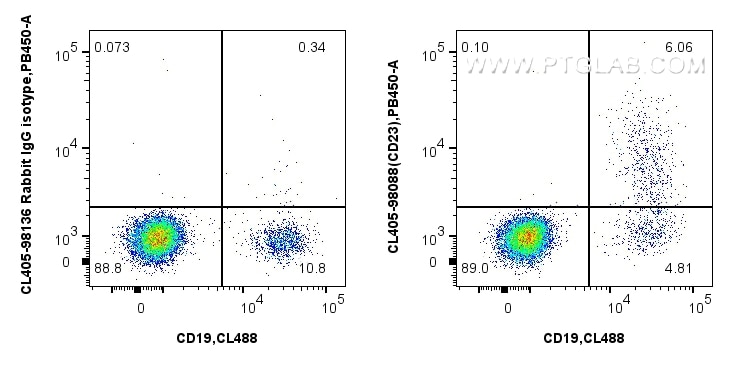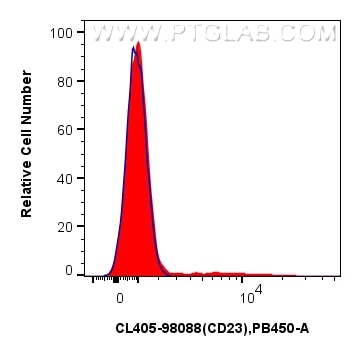Tested Applications
| Positive FC detected in | human PBMCs |
Recommended dilution
| Application | Dilution |
|---|---|
| Flow Cytometry (FC) | FC : 5 ul per 10^6 cells in 100 μl suspension |
| This reagent has been pre-titrated and tested for flow cytometric analysis. The suggested use of this reagent is 5 ul per 10^6 cells in a 100 µl suspension or 5 ul per 100 µl of whole blood. | |
| Sample-dependent, Check data in validation data gallery. | |
Product Information
CL405-98088 targets CD23 in FC applications and shows reactivity with human samples.
| Tested Reactivity | human |
| Host / Isotype | Rabbit / IgG |
| Class | Recombinant |
| Type | Antibody |
| Immunogen |
Recombinant Protein Predict reactive species |
| Full Name | Fc fragment of IgE, low affinity II, receptor for (CD23) |
| Calculated Molecular Weight | 321 aa, 36 kDa |
| GenBank Accession Number | BC064417 |
| Gene Symbol | CD23 |
| Gene ID (NCBI) | 2208 |
| Conjugate | CoraLite® Plus 405 Fluorescent Dye |
| Excitation/Emission Maxima Wavelengths | 399 nm / 422 nm |
| Form | Liquid |
| Purification Method | Protein A purification |
| UNIPROT ID | P06734 |
| Storage Buffer | PBS with 0.09% sodium azide and 0.5% BSA, pH 7.3. |
| Storage Conditions | Store at 2-8°C. Avoid exposure to light. Stable for one year after shipment. |
Background Information
CD23, also known as low affinity immunoglobulin epsilon Fc receptor, is a transmembrane glycoprotein present on a subpopulation of B lymphocytes in germinal centres, EBV-transformed B-lymphoblastoid cell lines, follicular dendritic cells, and a subpopulation of peripheral blood cells. CD23 has essential roles in the regulation of IgE production and in the differentiation of B-cells.
Protocols
| Product Specific Protocols | |
|---|---|
| FC protocol for CL Plus 405 CD23 antibody CL405-98088 | Download protocol |
| Standard Protocols | |
|---|---|
| Click here to view our Standard Protocols |






